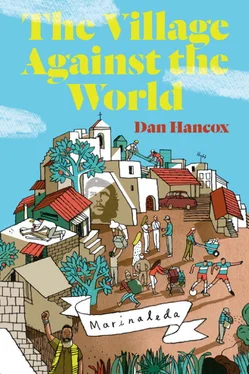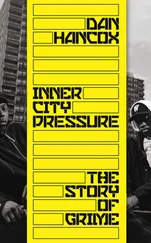What about Marinaleda, as an alternative? He shrugged. It’s good that you can have a free house and a job there, but it’s not all great, he said. ‘You know you have to work on Sundays?’
In Seville, a woman in her mid-twenties called Emma told me that about 90 per cent of her friends were out of work, and most of them had had to move back into their family homes after a few fleeting years of adult freedom. ‘I’m talking about all different kinds of people, people with no qualifications, people who have a masters, people who have two degrees.’ She went on:
‘It’s really, really bad here. Seville had so many building companies before the “brick crisis”, as we call it. You have so many unemployed young and not so young people with no other qualification than to work in construction. We have thousands of flats where construction just stopped, and the buildings are left half-finished.’ These relics of late capitalism scar the whole Spanish landscape now.
A lot of her friends left school when they were fifteen, Emma explained. The authorities didn’t really mind, because they knew there was work available, and they needed people to do it. ‘The government just said, “Okay, leave school, go!” So now in the south you have a lot of young unemployed people with no qualifications, but they have a house and they have a family and they have a loan, and they need to pay for everything – and they can’t go back to school, because they have responsibilities. What are you going to do in that situation?’
There is little else to do but come out into the plazas, in fact – either to idle, or to organise. Access to the monthly unemployment benefit is being limited, she said, with new applicants blocked by bureaucracy – because the government’s austerity programme simply can’t afford to give it to everyone who is unemployed; there are just too many of them.
Back in Marinaleda we were invited to visit one of the casitas , the self-built houses, belonging to a family with two grown-up children facing up to the realities of the crisis-era job market. The invite had come via Javi’s twenty-seven-year-old friend Ezequiel, who I’d met once in London, when he was a diffident young man lost in the big city, mute from lack of English, slightly perplexed at my enthusiasm for his obscure little pueblo . His family story is a common one – like Cristina’s parents, his grandparents migrated north in search of work in the 1950s. His father was born in Barcelona but went back to his roots, to Marinaleda, to find work when the struggle for land began, and soon met Ezequiel’s mother, from Estepa. ‘A lot of people never came back to the south,’ Javi explained.
Ezequiel had returned to his parents’ house because he had a couple of days off from his job working in a Seville hotel reception, and greeted us warmly – cheeky smiles swim near the surface of the Andalusian gene pool. The house was lovely; modest but big enough, clean but lived-in. Each of the 350 casitas built under Sánchez Gordillo’s leadership consists of ninety square meters for construction and 100 square meters for a patio or garden, and normally incorporates three bedrooms, a bathroom, living room, kitchen and courtyard. The living room was dominated by a towering bookcase and a large cage of chirruping birds. ‘Say “Gordillo”!’ Javi instructed a parrot, pointing a finger at it mock sternly. The parrot looked at him impassively and puffed its chest out. ‘Say “communism”!’ The bird refused.
Ezequiel is one of many young marinaleños torn between utopia and the wider world. He wanted to do something more exciting than farming, he explained, whatever the benefits of the co-operative might be. He spent most of the week working in the hotel in Seville, improving his English, renting a small room in a flat there, but even so hadn’t quite cut the apron-strings to utopia: he was still coming back to stay at his parents’ house most weeks and was on the waiting list to build a casita of his own in Marinaleda, in spite of his wanderlust. A fifteen-euro-a-month ‘mortgage’ for a brand-new house in his pueblo , especially in the context of the Spanish housing crisis, would be pretty hard to argue with.
Did you like it, growing up here? I asked him. ‘Sure. But if you don’t want to work in the fields, what do you do?’ What indeed. You probably have to leave for the big city or the coast. Do people here grow up as communists? I wondered. He seemed unsure of what to say. ‘Many people become communists, because they want to work, or they want to have a house, but not because they are communist. They don’t sit at home reading Karl Marx.’
In a way, Ezequiel was no different than any Spaniard of his age – more enticed by the possibilities of gallivanting and adventure than by Sánchez Gordillo’s earnest poems about struggle. His parents came back from Catalunya to join the revolution, he acknowledged. ‘Ah, but this generation, they don’t care about communism,’ interrupted Javi, mocking Ezequiel for his ideological heresy. There was some truth to Javi’s jibe, and I heard it said more than once in the village, and in the surrounding pueblos , that those who inherited utopia may not treat it with the same reverence as those who struggled to create it.
And yet, even with Ezequiel, it felt like a certain level of solidarity had been unconsciously embedded: despite his middling English, he wanted to practice, and told a lucid English-language version of the history of the land seizures that had happened before he was born. The Duke of Infantado, he said, was ‘just walking around with a horse, while people starved in Marinaleda’. And then he reeled off the word ‘expropriated’ without a second thought.
Most English people don’t know the word ‘expropriated’, I told him.

5
Bread and Roses
With the exception of the ferocious heat of high summer, Marinaleda feels at its most utopian in the afternoon. La tarde starts not at noon, but when work starts winding down and lunch and siesta time commence, between 2 and 4 pm. The village’s few shops and workshops close, workers drift back from the fields and the factory, the pensioners finish their games of cards, and parents stand outside the primary school gates, chatting idly as the kids run in circles around their legs.
Some stop off for a drink on their way home and sip small glasses of beer called cañitas (normally about a third of a pint) under the sun-gazebo in front of Bar Gervasio and at the tables outside Bar Sur. Lunch, which never starts before 3 pm, is normally a long-drawn-out affair involving several courses, with loaves of bread broken up into big hunks sitting on the table next to platters of grilled chicken or pork, rich stews of lentils and beans, fanned triangles of manchego and bowls of pale, watery lettuce, tossed with tuna and sweetcorn.
Home is where the stomach is, but the social centre of the Spanish pueblo , as Julian Pitt-Rivers observed in his book The People of the Sierra , is outdoors, in the streets themselves. During la tarde , the broad, tree-lined promenade that runs next to the Avenida de la Libertad, connecting Marinaleda to nearby Matarredonda, is teeming with activity. Gaggles of middle-aged women walk four abreast, men just turning grey jog in pairs, and teenage boys on bikes do that half-standing, half-cycling soft-pedal thing that only teenage boys can pull off, while the girls walk behind them, laughing. The older youths are kitted out as cool young sportsmen, and pose with their lightweight motorbikes, or lean on car doors showing off their tracksuits, like aspiring alpha males everywhere.
Читать дальше













